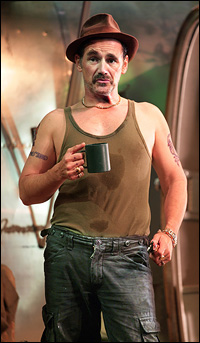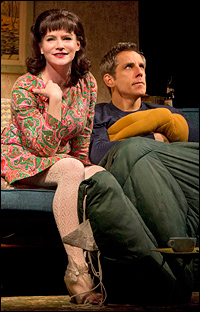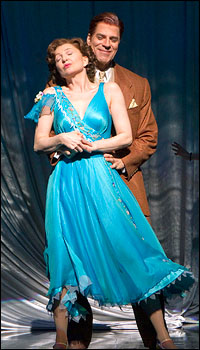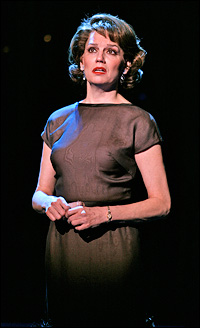
The show that arguably fared the best in this cultural traffic jam was the one that got its act together last: the Broadway debut of Larry Kramer's groundbreaking, tough-minded AIDS play The Normal Heart. It started life as a benefit reading a few months back, and only hit the tracks for Broadway when a theatre came free and the I'll-never-act-again director Joe Mantello committed to the lead role of Ned Weeks.
Critics largely found the piece had not lost its power, and was not simply a powerful period piece, but a well-made play endowed with a urgent timelessness. "Mr. Kramer is truly a playwright as well as a pamphleteer," decreed the Times, which has not always been kind to Kramer. (To be fair, Kramer has been less than kind to the Times.) "The play still works because it has the power to move and disturb us," said one critic. Another stated, "This is tough, unflinching drama staged and performed by people with a fierce emotional investment in telling this story and keeping this painful history alive for generations inclined to forget." Mantello was roundly praised as a perfect Weeks, engaging and off-putting in equal measures, and 100-percent there.
 |
||
| Mark Rylance in Jerusalem. |
||
| photo by Simon Annand |
"It thinks big — transcendently big — in ways contemporary drama seldom dares," wrote one scribe. "The show is testament to the ever-expanding voice and vision of Butterworth, whose mighty verbal broadsword just freakin' sings," said another. Rylance's committed, exhilarating performance as the blustery, society-rejecting antihero Rooster, it was agreed, was the production's glory; his performance was compared to a number of historic and mythic figures, from Falstaff to Fagin to the Pied Piper. But, others noted, that same performance was a bit of a liability, as it cast all the other fine actors in shadow. "Only the glorious bag-of-bones Mackenzie Crook, playing an aging forever-hometown boy in a tragic hoodie, even gets close to getting close to Rylance's Rooster," said one review.
 |
||
| Robert Sean Leonard and Nina Arianda in Born Yesterday. |
||
| photo by Carol Rosegg |
When's the last time a Broadway producer knowingly served up a production as a vehicle for an unknown? Sometimes the commercial theatre's full of surprises.
 |
||
| Jennifer Jason Leigh and Ben Stiller in The House of Blue Leaves |
||
| photo by Joan Marcus |
With Guare's dark comedy, the general consensus was that Cromer has followed his usual pattern with texts, and emphasized the "dark" over the "comedy." "There's little that's transporting here in Mr. Guare's wild, yearning language," wrote the Times. "Mr. Cromer has rebuilt his House in the style of kitchen-sink dramas, the kind in which unhappy families simmer in squalor and explode with a whimper." The play was "too tame and emotionally mellow for its own good," said another. "Cromer downplays most of its humor to ill effect." Still another: "Bottom Line — David Cromer's production overplays the melancholy and under-serves the humor, but the enduring originality of John Guare's breakthrough play prevails." The one bright spot that all agreed on was Falco, who, as the sad, neglected Bananas, gave the best performance, showing an "ability to play both comedy and tragedy in the same breath."
 |
||
| Donna Murphy and Christopher Innvar in The People in the Picture |
||
| photo by Joan Marcus |
"Without Ms. Murphy, this well-meaning Roundabout Theatre Company production would be thin treacle indeed," went one of the many critical wails. "As it is, even Ms. Murphy has trouble generating the kind of energy that makes an audience sit up and smile, or sit up, period." One critic credited the actress not just with acting and singing, but working "tirelessly to perform CPR on a DOA show." That show, it was said, had subpar music and a sentimental, "four-hanky screen tearjerker" book that was full of holes, plus a "plethora of tear-inducing triggers, including a Camille-like death scene."
Another review led with this, which can't help but quote: "It feels ungrateful to dismiss any new musical that offers Donna Murphy a chance to play a Nazi-oppressed Polish star of the Yiddish theatre and an old Jewish grandmother in New York, to be so persuasively comic and tragic, to use so many parts of her marvelous voice in traditional Broadway ballads, operetta, vaudeville and the ancient stirrings in the klezmer music." How can you argue with that?
 |
||
| Beth Leavel in Baby It's You! |
||
| photo by Ari Mintz |
"Mama said there'll be shows like this," is how the Times review began. Critics asked us to "imagine Jersey Boys without the carefully integrated character development of Frankie Valli and Bob Gaudio, and with a tunestack only one quarter as imperishable"; pointed out that "It becomes clear by the second act that Greenberg's story — or the acts she discovered — cannot sustain this musical"; and called the enterprise "a show of such total ineptitude and cynical profiteering that your mouth pretty much dangles open in disbelief for the duration of the entire tawdry proceedings." (Wow.) As for star Beth Leavel, she "is a fine singer and gifted musical-comedy performer who deserves better than this stereotypical cutout."
And if that wasn't enough bad news for the producers, there was this: the day the musical opened on Broadway, the law firm Baker Hostetler filed a complaint in the Supreme Court of the State of New York seeking "damages on behalf of world-famous performers Beverly Lee of The Shirelles, Dionne Warwick and Chuck Jackson, as well as the Estates of [original Shirelles] Doris Coley Jackson and Addie Harris Jackson, for the unauthorized use of their names and likenesses in connection with the new Broadway show, Baby It's You!" Um, does Baker Hostetler think this show is making money?
***
Theatredom's various awards groups started handing out nominations this week.
The nominations for the 56th Annual Drama Desk Awards, honoring productions that opened on Broadway, Off-Broadway and Off Off-Broadway during the 2010-2011 New York theatre season, were announced April 29. The two best-reviewed musicals of the season, the new musical The Book of Mormon and the Sutton Foster revival of Anything Goes, received 12 and 10 nominations, respectively, the most of any shows of the season.
On April 26, the nominees for the 2010-11 Outer Critics Circle Awards,
***
We had to wait nearly 30 years for the most recent Broadway revival of Edward Albee's Who's Afraid of Virginia Woolf?, which was in 2005. But, as the song goes, everything's going too fast these days. The play will return to Broadway in October 2012 in an acclaimed new production seen in 2010-11 at Steppenwolf Theatre in Chicago and Arena Stage in Washington, DC. And surprise, surprise. A show that is usually reserved for star types (Kathleen Turner, Colleen Dewhurst) will be headlined by Tracy Letts and Amy Morton, fine actors both (and also a fine playwright, in the case of Letts), but with, you'll excuse me for saying, nearly zero name recognition in New York.
But who am I to deny Albee a staging that celebrates the 50th anniversary of the groundbreaking 1962 play? Opening night, in fact, will be Oct. 13, 2012, exactly 50 years to the date after the play's original Broadway opening.











